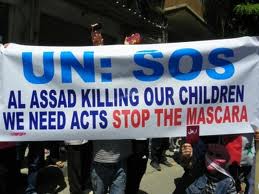Although I did not vote for him for President, I have always admired Sen. John McCain's foreign policy and national security positions and respected his personal heroism. We owe the Iraqi surge to him, without which we may have never attempted the surge in Afghanistan, which despite many difficulties, has changed the balance in that troubled country. Sen. McCain wants us to bomb the Syrian military, which is indiscriminately killing its own citizens, and to set up a no-fly zone in addition to aiding the Free Syrian Army. He is supported in this by Sen. Joe Lieberman as well.
I say yes, and as soon as possible. Our country has normally been cautious about throwing itself into war, as it should be. Wounded by Vietnam and the Somali Blackhawk Down debacle, we hesitated much too long to launch into Bosnia. It was only when media attention to near genocide by the Serbians had built up to an intolerable level that we finally intervened. Without Bosnia, it is doubtful we would have intervened in Haiti in 1994 or continued to help Kosovo. Now we feel once again "burned" by Iraq and Afghanistan and uninterested in launching into another war in the Muslim world. But we felt that way also about Libya, and finally changed our minds as a possible slaughter in Bengazi was confronting us. (The shadow of Rwanda still hangs heavily over us.) With leadership from NATO and a shift within the administration led by human rights activists, we took the plunge in Libya.
Now we say that Syria and Libya are different. Gaddafi's regime was isolated and militarily weaker than Assad's. After all Assad has the support of not only Iran but also the Russians, who mistakenly see this as an example of interference in an ally's internal affairs and a manifestation of Russia's new "independence" from the West, particularly the United States. As the media points out, Putin's electoral victory is certainly pyrrich. But he must feel threatened by the growing public dissatisfaction with a government that clings to power at all costs, and sees vibrations of the Arab Spring fueling the opposition, not dissimilar to what is happening in Syria. To approve of foreign intervention in Syria, legitimizes foreign support for opposition to him. Don't get me wrong, Putin is not Assad, and has not turned his army on his own people, nor would he. More sophisticated tools are at his disposal to stave off an upheaval. Furthermore, it would be wrong to think that he does not have broad support among working class Russians. Unfortunately for him, it is the middle class, the intelligentsia and the educated, info age youth--i.e., the constituency of the future--who are yearning for greater freedom. What is happening today, driven by new media and unlimited information, is a major global revolution, not unlike those that swept forward in 1968 and 1990. However, it is actually just the latest and most hopeful chapter in the long sweep of democratic change since the end of World War II.
What we hear from the Obama administration is that a military intervention could provoke greater violence than it resolves, feeding a civil war. In truth, there is already a civil war, but it is terribly lopsided in arms on the part of the Assad regime. What is most crucial, however, is that the case of Syria is clearly one of crimes against humanity of such a scale that they cannot be tolerated. The international community has an obligation to protect innocent--including peacefully protesting civilians-from mass slaughter by its government. The days are over when we can simply look the other way or ring our hands in doubt. How many thousands more innocent civilians must die? Also, it is cowardly to wait until public opinion and the media build up enough pressure so that action is politically acceptable. This is true even in an election year where the risks may seem greater.
We have also heard that the Syrian leadership is divided and we must understand who we are supporting before we engage. The same dilemma obtained in Libya, but eventually we found our way to intervention. Even if we do not know who to support right now, we should know who the enemy is: Assad's military, its tanks, armored cars, artillery and command and control centers and large military formations and bases. If we are so worried about Syrian anti-aircraft weapons and "putting our troops into harm's way," let us start out by using only stealth bombers. This would have a huge psychological as well as strategic impact. We also should provide enough weapons for the Syrian people and Free Syrian Army to defend themselves, including a good supply of hand held anti-armor weapons. And we should help create a no-fly zone where the Syrian opposition can consider a safe haven. Hopefully, other Muslim countries, Turkey, Saudi Arabia and the Gulf states, would come to their assistance with a strong endorsement of the League of Arab States.
We should not wait for the United Nations Security Council to approve of what we will do. We might have to settle for a regional organization like the League of Arab States, to provide its own endorsement under the UN Charter. Although article 52 of the Charter requires Security Council approval for use of force by regional organizations, this provision, though widely defended by legal scholars has often been challenged in practice.
Most recently, the 1998 ECOWAS intervention in Sierra Leone was only approved by the Security Council after the fact and in muted terms. There is a long tradition of humanitarian intervention in states and more recently the "responsibility to protect" doctrine (R2P-for more background seee http://www.responsibilitytoprotect.org/index.php/crises/crisis-in-syria). According to a study of the ECOWAS intervention, "Some commentators suggest that such unilateral actions should not be judged in terms of the prohibition contained in the United Nations Charter because the Security Council deadlocked during the 1970s and did not reach any decision concerning humanitarian intervention. When the Security Council is unable to authorize intervention due to internal political squabbles, it is legitimate for a state to act unilaterally to end gross violation of human rights in another state, particularly when international peace is threatened." (The Use Of Force To Restore Democracy: International Legal Implications Of The Ecowas Intervention In Sierra Leone-1998). We face a similar Security Council deadlock today..
So let's stop futzing around and help to save the Syrian people and enable them to overthrow a ruler and a regime which can only be considered a criminal enterprise in every sense of the term. He can not be trusted or negotiated with. There can be no diplomatic solution to the Syrian Revolution. We must answer their pleas for our help.
Thursday, March 8, 2012
Subscribe to:
Post Comments (Atom)



.bmp)
No comments:
Post a Comment